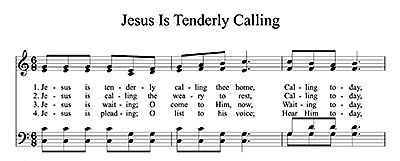Hebrews 3:7–19 . . .
“Don’t Harden Your Heart”
Remembering last week's "Jesus, Greater than Moses" study, we saw how the author resumed his argument that Christ is superior to Mosaic Law by comparing him to Moses, the giver of the Law. The meaning of the argument: If Christ is superior to Moses, then Christ is superior to the Law. We were told in 3:1–6 that Moses was a servant and Christ is a Son. To prove Christ’s superiority, the author again used a servant-son contrast: Although Moses was the greatest prophet in Israel’s history, he was only a servant, while Christ is Father God’s Son.
In today's study, the author has paused his comparison of Christ and Moses to discuss the role of God's people. Israel’s response to Moses and God documented their unbelief. In 3:7–11 is a quotation from Psalm 95:7–11 regarding Israel's rebellion (see Numbers 14), following the return of their spies from Canaan. Just as many of the Hebrews who started their journey to Canaan behaved unrighteously, thereby preventing them from entering the promised land, many of the Jews in Jesus' day started out on their Judaism journey, looking for the Messiah, only to fail to faithfully accept Christ as Messiah.
God’s people have always struggled with discouragement and doubt. Quoting Psalm 95, which affirms that God’s voice can be heard through the Holy Spirit, the writer of Hebrews warned believers in Jesus to avoid the mistakes made by the Israelites while wandering in the wilderness (Hebrews 3:7–11). “See to it, brothers and sisters, that none of you has a sinful, unbelieving heart that turns away from the living God,” he wrote. “But encourage one another daily” (vv. 12–13).
“Do Not Harden Your Hearts” (3:7–11)
Depending on the version, the "So" or "Therefore" that starts v. 7 (Greek Diov) indicates that our author connects this passage with last week's passage, vv. 1-6, which also started with Diov. The Son humbled himself by taking on humanity; by virtue of his identification with man, he provided an opportunity for man's salvation. Each "So" or "Therefore" should direct our attention to Jesus, the apostle and high priest whom we're to acknowledge. Because the Son is greater than Moses, we're obligated to "hear His voice" (v. 7).
These things tie together and build on one another, documenting Christ's superiority and the contrast in this warning passage: You are either a true believer in Jesus Christ, have trusted him alone as your Savior, and will follow him faithfully, or you have an unbelieving heart and will drift away from him.
Warning Against Unbelief
7So, as the Holy Spirit says: “Today, if you hear his voice, 8do not harden your hearts as you did in the rebellion, during the time of testing in the wilderness, 9where your ancestors tested and tried me, though for forty years they saw what I did. 10That is why I was angry with that generation; I said, ‘Their hearts are always going astray, and they have not known my ways.’ 11So I declared on oath in my anger, ‘They shall never enter my rest’” (3:7–11).
This wilderness example illustrates what happened to those who didn't have requisite faith to "hold firmly to our confidence and the hope in which we glory" (3:6). The Israelites hardened their hearts and doubted God’s ability, goodness, and more, refusing to trust him to conquer the enemies in the land. The result that we'll soon see was that they forfeited their right to enter God's promised land and experience his rest (v. 11). Faith requires active belief, confidence, and trust in God. But many of the people didn't have a strong, unquestionable faith in God. Lacking faith, they trusted their own feelings more than obeying God’s Word. He wanted them to love him with all their hearts (Deuteronomy 6:5). Instead, they had unrighteous, selfish attitudes. Such lack of faith ruins a person’s relationship with God. It's what happened in the desert, a la Psalm 95, which is why the "Hebrews" author warned Christian believers: Don't let this happen to you, too (v. 8).
The Bible often tells us the sad story of the 40 years that God’s people spent in the desert, highlighted in vv. 7–10. Moses, God's servant and their leader, trusted God completely. But, on several occasions, the people refused to trust God, preferring to complain to Moses. Such personal rebellion happens often when people fail to trust God. Instead, they begin to refuse to obey him. But, time after time, miracle after miracle, the people should have learned that they could trust God completely! It was he who'd (1) saved them from their sad existence as slaves in Egypt, (2) overcome Egypt’s powerful army, (3) provided them with adequate food and water, and (4) showed them the best route to follow. God continually defended them from enemy attacks. The Israelites had no one else to rely on but every reason to fully trust God.
Verse 9 also refers to "your ancestors" or "your fathers." Proud of their family's history, people used to speak similarly about family members from previous centuries. They were sometimes proud that the man named Moses had been their leader. But they shouldn't have been so proud of him when it was God who was caring for his nation. Ironically, while proud of their families, it was their ancestors who refused to trust and obey Father God as he led them through the desert. That generation of people forfeited the opportunity to live in God's promised land.
Realize next that it's God who's angrily speaking the words of v. 10. Israel’s hearts had been stubborn (v. 8) and God’s anger was provoked because "their hearts are always going astray," even though they routinely experienced God’s saving presence during their forty-year wilderness sojourn. Scripturally, the "heart" is an inward place where decisions are made. A believer’s spiritual habits, motives, and inclinations get shaped by the heart. It’s also where we experience conflict with God’s means of salvation and the choices we make, for or against God’s Word. It's important to remember that God is speaking the quoted text of these first five verses about a portion of Old Testament Scripture that David wrote emphatically: Psalm 95. Remember: "Hebrews" began by telling us, "In the past God spoke to our ancestors through the prophets at many times and in various ways, but in these last days he has spoken to us by his Son" (1:1). So, it's God who's now speaking! Disobedience to David and disobedience to Moses are disobedience to God; and disobedience to Jesus is disobedience to God's Word.
Look at the context of what David the psalmist had written in Psalm 95:1–6: He exhorted them to worship, honor, and praise God, bowing in his presence as his people. Then, in 95:7–8, he added, "Today, if only you would hear his voice, 'Do not harden your hearts as you did at Meribah, as you did that day at Massah in the wilderness." In fact, what the author of "Hebrews" included in 3:7-11 was what David had written in vv. 7–11 of his psalm; this exhortation in "Hebrews" resembles a reiteration of David's exhortation of Psalm 95, wherein the Holy Spirit is speaking. In both Old and New Testament Scriptures, we're given a call to worship that's accompanied by a warning to never have an evil, unbelieving heart that's become hardened toward God, causing us to not bow down to him in submission and obedience.
Psalm 95's lesson, for those who received, read, and heard this epistle to the Hebrews, warned believers against (a) disregarding God’s Word, (b) forsaking their worship effort, and (c) having hope and encouragement that can be gained individually and collectively. Ignoring God’s ways leads to developing a rebellious, hardened heart. That is, disregarding his Word and failing to worship God keeps one from entering into "God’s rest," a term which we'll appreciate in an upcoming commentary, which will be a fascinating discussion.
“But Encourage One Another Daily” (3:12–14)
In the remaining eight verses, the author will apply Israel's example to his reading audience. Just as the children of Israel failed to enter the promised land because of their unbelief, his audience of believers may also similarly fail to enter God’s rest in the kingdom and fail to share in Christ’s reign, if they aren't faithful.
12See to it, brothers and sisters, that none of you has a sinful, unbelieving heart that turns away from the living God. 13But encourage one another daily, as long as it is called “Today,” so that none of you may be hardened by sin’s deceitfulness. 14We have come to share in Christ, if indeed we hold our original conviction firmly to the very end (3:12–14).
Every member of the church is responsible for the spiritual health and wellbeing of all church-body members. As a body, we're obligated to care for one another. Thus, the "brothers and sisters" or "brethren" of v. 12 were Jewish people who declined to receive Jesus as their Messiah, constituting their "turning away from the living God" as a result of becoming heart-hardened by sin's deception.
Such deceit and heart-hardening takes time. We members of Christ's body must be alert to a possible hardening of our own hearts and certainly others' hearts. Because sin is so deceitful, and because people with hardened hearts don’t see things clearly, we believers must take responsibility for others' spiritual welfare. What a sinner can't see or sense, we, as his or her accountability partner, should look for, recognize, and attempt to help correct.
Our writer includes in v. 13 a command for believers to "encourage" or "exhort" one another, daily, to follow through with Judaism's scriptural completion: receiving Jesus as Messiah and not being hardened by sin's deceitfulness (as were the rebels highlighted in Numbers 14). Biblical religion doesn't subscribe to a do-it-yourself spirituality. Believers are called by God into partnership with Christ (Hebrews 3:14). "Hebrews" repeats the idea of a community’s partnership with Christ and one another to underscore its importance to Christian life. The Greek metochos that starts off v. 14 literally means "to be a part of something" or "companionship on a journey." In this case, the journey takes the community of believers through their wilderness, where solidarity of community is critical to enduring suffering and spiritual testing.
Hear the drumbeat of the author's repetition of the psalmist’s opening word, "Today" (Hebrews 3:13, 15; 4:7). For the Israelites, "Today" was a day of decision-making; the day when God’s people were prompted by their wilderness experience to choose God. For Israel and for us, "Today" amounts every day (v. 13).
“Today, If You Hear His Voice” (3:15–19)
Next, the author highlights the grim result of Israel’s bad decisions from its lack of faith. The nation failed God because it didn't listen to and accept his words, albeit translated for them by Moses.
15As has just been said: “Today, if you hear his voice, do not harden your hearts as you did in the rebellion.”
16Who were they who heard and rebelled? Were they not all those Moses led out of Egypt? 17And with whom was he angry for forty years? Was it not with those who sinned, whose bodies perished in the wilderness? 18And to whom did God swear that they would never enter his rest if not to those who disobeyed? 19So we see that they were not able to enter, because of their unbelief (3:15–19).
The word "hear" (v. 15) means more than listening carefully to God’s delivered Word; it must also be obeyed (see James 1:21–27). The first generation of Hebrews, with whom the readers of this epistle are compared, listened to Father God’s voice, as mediated through Moses; sadly, they repeatedly failed to obey it. Likewise, Jesus' disciples had heard and learned about his Word through his apostles; it was essential for them to obey his Word. If God’s Word was received but not obeyed, the blessings that he'd promised to his covenant community were, unfortunately, never realized. That's why 𝄞 "Jesus Is Tenderly Calling . . . the weary to rest; bring Him thy burden and thou shalt be blest."
In v. 15, our author revisits the quote of vv. 7–8, regarding those rebels in Numbers 14 who'd hardened their hearts. In vv. 16 and 17, he isn't requesting answers when he asks his three questions; he's calling attention to the facts of the matter. As a result of their unbelief, the Israelites continually rebelled against God’s commands; disobedience to God’s commands is rebellion, which brings discipline. He then uses the last four verses (16–19) to drive home the implications of that rebellion account. Those rebels lived for 40 more years without the hope of entering the promised land because they'd rejected God on a fateful day when their spies gave them their report about that land. In essence, he told his readers then, as he's telling us today, Don't let this happen to you! Don't let your sin keep you from obeying the truth like your forefathers had done in the wilderness. In other words: Don't reject Christ the way your forefathers rejected Moses.
Closing Considerations (from Dr. Charles Stanley)
Spiritual drifting — the gradual wandering away from God and His will (3:12–13) — takes place when a believer ceases to steer toward the Lord. There are consequences for slipping into uncharted, dangerous waters. A life adrift is outside of God's will and is therefore in sin. Although the Holy Spirit pricks the conscience to send a message when a believer goes off course, a drifter is prone to ignore such warnings.
As the drifting believer's conscience becomes anesthetized, his spiritual ears are also deadened; truth can't gain entrance, causing his heart to harden to God's will. People drift from God in search of more; more freedom, choices, and pleasure. But since the consequences are a hard heart, a numb conscience, and dead ears, what they end up with is less. The drifting believer sacrifices the victorious life in Christ for an existence devoid of permanent satisfaction.
The Hebrews who left Egypt had concrete proof of God's existence and commitment to them. Yet when the time came for them to claim their promised land, they hardened their hearts against the Lord and refused to believe that he would give them victory over the Canaanites. So they rebelled, resisting Joshua and Caleb's pleas, coming up with justifications for their disbelief.
God responded with harsh discipline for 40 years. Considering how important the lesson about their resistance and discipline was to his people, the Lord reiterated it in 3:7–11. He didn't want anyone to repeat the Israelites' mistake of hardening their hearts against Him and drifting away from Him. We believers today won't drift away with a hard heart, so long as we accept and devotedly live out a firm belief in Jesus. If we enter into God’s rest, the coming years will only increase our trust and reliance on Him. But if we fail to enter his rest because of our unbelief, the coming years will likely gradually draw us away from enjoying a passionate, trusting relationship with Jesus.
- Q. 1 Are you listening "today" to what God has to say through Christ? How obedient are you to what his Word says?
- Q. 2 If you were to sense a possible drifting away from Jesus, who would you contact and why?
Hebrews 3:7–19
New International Version (NIV) or view it in a different version by clicking here.
— Listen to chapter 3, narrated by Max McLean.




